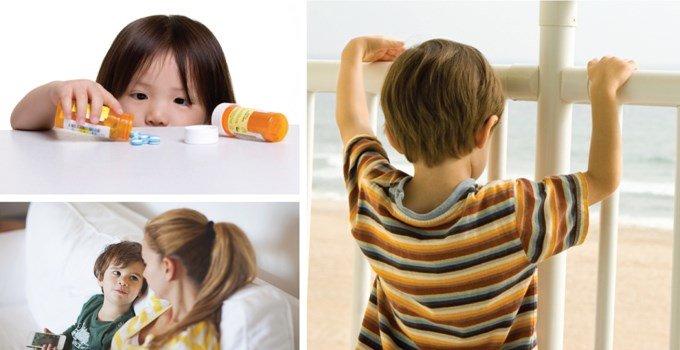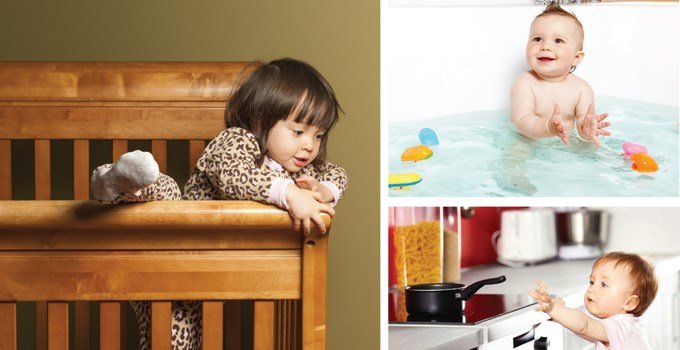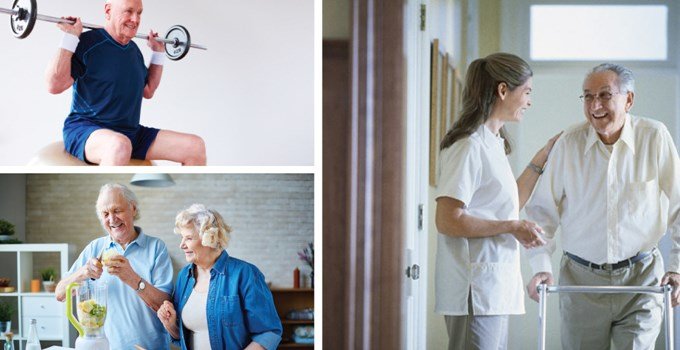What are the risk factors or most frequent causes of home accidents?
- Slip when walking on wet floors, wet or waxed
- Walking with socks or wear slippers and ill-tight shoes
- Furniture along the way (open drawers, for example), specially between the bedroom and bathroom
- Stairs with different sizes steps
- Carpets in the bedrooms, bathrooms, halls and other rooms of the house without anti-slip protection
- Lack of lighting
- Standing on the top of a bench or chair
- Dizziness when standing up
- Vision changes due to age
- Loss of balance, most of the time caused by meds
- In old people, weakening bones and muscles
- Uneven sills

Small children are not aware of the danger and therefore, any object they find at home can be turned into a very interesting toy. It is very important to learn how to protect them from any danger present in every home.
Buttons, caps and bottle caps, coins, small nails, screws and even toys with small parts too are an irresistible attraction for children up to three years, who like to stick them to their mouth. But these objects are really dangerous, because children may choke and even suffocate.
Causes of accidents
Do you know that, for example, falls are the leading cause of domestic accidents with children? Following are the cuts, burns and poisoning.
Attitudes that can save a children
- Do not just prohibit children from doing this or that; you should teach them and alert them to the risks that certain acts involve, so that they can develop a sense of what is dangerous and what is a dangerous behavior. You should teach them even when they are small and the explanation requires more patience.
- Above all, you do need to lead by example: children usually imitate adults.
- Whenever is necessary, explain to them why adults are allowed to do some actions while they aren't allowed, by pointing reasons of age, ability, responsibility, safety, etc.
Be careful with the meds
- All the medication should be kept away from children, in high places and, even better, in closets or boxes tightly closed.
- Do not take or give non-prescription drugs without medical advice
- Do not let your medications near children and, preferably, do not take meds in front of them, as they tend to imitate adults
- Do not take meds that their shelf life has expired or with damage packaging. Instead, delivered them in the nearest pharmacy
Care stairs
- Stairs should have a support railing and the floor should not be smooth (slippery)
- If you have young children, especially if they are in their crawling stage or start walking, use some protections and barriers (gates) in all the accesses to the stairs of the house.
- Do not forget to close the protections and barriers of access to the stairs after passing. A barely close gate is as if it doesn’t exist.
Caring for windows and balconies
- Just put bars or safety nets on all windows and balconies. This is the only way to prevent major accidents in apartments. A door or an open window represent a big danger. There are many children that falls as a result of an opened window or door.
Caring for pools, lakes, lagoons and even on the beach
- Never leave your child alone near a pool, even if it is her own pool.
- Never leave a child alone in the pool, in any circumstances. Many children drowning’s, up to 4 years old, just happen because adults are distracted "for a minute" to answer the phone, get a snack, etc.
- Be aware when children are playing in the water.
- Use armbands or vests on children who can't swim, even when they are playing by the pool. If they slip and fall into the water they will be more protected.
- If you have a pool at home, place a fence or a protective screen around the pool in order to prevent the child access to the water.
Kitchen care
- Do not leave children alone in the kitchen.
- Keep knifes and sharp objects inaccessible.
- Do not leave pots and pans on the stove when there is no one in the kitchen, and take special care with hot liquids such as soup or boiling water, since burns with hot liquids are frequent in children.
- Do not let the gas hobs connected after you finish cooking.
- Turn the frying pan cables to the interior of the cooker to prevent children from attempting to pick them
- You can remove the stove knobs when they are not in use
- Keep the matches well saved because children are not afraid of fire and some games can cause fires
- Toasters, pots, vacuum flasks and other equipment should be kept away of children
- Be careful when you use pressure cookers. You should always follow the manufacturer's instructions
- Be careful when you use gas on the stove. Light the match before opening the gas. If your stove has electric igniter, first you should light the gas at least, and only then start the lighter
- When lighting the oven, place yourself on the side and never in front of the stove
- Only use towels, aprons and natural woven cloths. Avoid wearing clothes made of synthetic fabrics and plastic aprons when you are cooking
- When using the microwave do not cover food with metallized papers or place, inside, crockery with silver or golden decoration (cause spark)
Care with cleaners and other toxic products
- Whether in the kitchen, pantry or in any room of the house or even in the garden, save these products in places inaccessible to children and animals
- There are closures and protectors (including locks) that prevent children from opening cabinets and drawers in the kitchen or in other places
- They are toxic, often even flammable, and the ingestion or inhalation of these products can have serious consequences and be even fatal
- Never place detergents, bleach, insecticides or pesticides in plastic water bottles already used because children can ingest the product thinking it is real water, resulting in an accident with great gravity
Care and electricity outlets
- If possible, all outlets should be earthed
- Install adequate protectors in all the outlets of the house, to prevent electric shock
- Always be alert because a switch plug has a special attraction to children, special those who are in the crawling stage or even a little more grown up, they are always looking for the perfect places to put their fingers on and also the most varied objects.
- Sharp or pointed objects
- Knives, scissors, key-of-cracks and other driller’s objects should never be given to children to play. Keep these objects indoors and inaccessible
- Iron and Ironing Board
- Do never let the iron bound with wire unwound. In addition to high temperature, it is dangerous due to the weight and the connection to electricity
- Avoid ironing boards that can be pulled down.
- Weapons
- Do not have guns at home. If so, place or keep them away of children
- Do never have loaded guns at home
- Do never leave the ammunition near the gun. Store them in a safe place and inaccessible to children.
Other risks
- Do never leave alcoholic beverages within the reach of children
- Search for medical attention if your child swallow a substance not feed
- Just have the numbers of your pediatrician, hospital, poison centers and other aid centers in a visible location (for example, by the phone);
- Read the package labels before using any product
- Teach your children to accept no drinks, food, sweets that are offered by adults they don’t recognize as friends
- Do not let children under the age of 10 years old to take the elevator alone.

You must care with potential falls
- Never leave your baby or child alone in bed or in the stand where you change his diapers and clothes
- Keep diapers, cleaning wipes and creams always near you
- Prepare the baby clothes in advance and have them nearby at the time you will dress your child.
Grids beds
- Use bed rails because they prevent the baby or child of falling down
- Ensure that the space between the crib bars are suitable. Usually the bars are adaptable in order to be easy to put on and take the child out of bed
- Do not forget to check if the grid is well placed after putting the child in the bed
- Take care when the child begins to show movements to sit, crawl or stand; it's time to adjust the grid to their new capacities;
- Make sure the platform is safe and the mattress is suitable
- Do not leave toys in the crib or baby bed.
Care bath
- Do never leave your child alone in the bath, whatever the circumstances are. Even with shallow water is very dangerous. A few seconds are enough to drown.
- Check the water temperature with a thermometer or with your elbow to avoid burning the child if the water is too hot
- Use non-slip mats or shapes in the bathtub.
Care toys
- Toys should be large enough so they can’t be swallowed by children. They must be strong enough so they don’t chip or break.
- Check the labels of the toys to see the materials they are made of, avoiding, for example, the risk of allergies
- Toys should not be sharp.
- Buy appropriate toys according to child's age and check if the ones that are gifts are also suitable.
Other risks
- Plastic bags, telephone cables, pillows and high and fluffy pillows can suffocate or strangle
- Do not let your child chew gum or eat candies
- Do not place the pacifiers around the child's neck
- Do not allow children to play with small objects that can be swallowed
- Do not drink hot liquids with your child on your lap. Keep hot liquids (coffee, tea, etc.) out of reach
- Protect the corners of the tables and other furniture that can be danger to the baby.

What are the risk factors or most frequent causes of home accidents involving old people?
- Vision and hearing disable
- Weakening of the bones and muscles
- Mobility problems or osteoarticular and tremors
- Environmental Factors
- Lack of light
- Lack of handrails or safety bars, particularly in the bathtub
- Unstable furniture
- Slippery floor
- Unsuitable footwear
About 75 percent of accidents happen when seniors are at home.
Accidents involving old people also happen in collective households (retirement homes, nursing homes and other residential institutions), in the surrounding environment or when they slip on the street.
Here's some advice for the seniors in order to prevent accidents:
- Practice exercise regularly in order to improve your fitness. Make a balanced diet
- Be careful, do not make mistakes in the dosage of the medicines you are taking
- Do not drink too much alcohol
- Use well-fitting shoes with non-slip soles (preferably with grooves). Avoid using leather and metal protective soles. The shoes must have broad heels, heel and reinforced clamps or laces, to prevent the feet of moving inside the shoes. Avoid wearing slippers
- Do not use nightgowns or long robes
- Display the furniture at home wisely. Leave space to walk from one side to the other without obstacles. Do not walk on slippery floors (wet or waxed); carpets must cover the entire floor, wall to wall, or have non-slip lining. Furniture should not have wheels and the bed and the chairs should not be too low or high. Put grab bars in the bathtub, the shower and besides the toilet too. Use non-slip rubber mats in the shower and the tub
- In light conveniently the house - bedroom, hallway, lounge, kitchen and bathroom
- Stairs should have good light, safe handrails and non-slip treads
- If you need glasses, use them.
- Do not use small carpets on the floor. Do not leave your drawers opened.
- Do not leave electrical or telephone wires on the floor. Secure them to the walls
- Keep all electrical appliances in good working order and safe from water splashes. Never use them while you are using water
- The heating should have good ventilation and you must use protection on the fireplaces
- The lawn, the garden, the patio, the passages for cars and sidewalks must be unimpeded, without holes, cracks or other irregularities
- Try to not be alone. Do not isolate yourself, as this may delay the arrival of help from outside in case of an accident
- Be alert to unexpected movements of animals, children and bikes
- Bring along a flashlight and use it so you can see and be seen in the darkness
- Do not be ashamed to ask for help to cross the street
- Use a walking stick, if your doctor agrees
- If possible, have a bell near you
If an accident happens:
- "If you fall, try getting up correctly. - fold up on the stomach, put on all fours and fours to the piece of furniture that is closest to you. Put your hands on it and put one of your feet forward and firmly on the floor. Stand up and then sit down, until you are recovered.
- If you can’t get up, try to get help – it’s really important to have a bell on the bedroom floor, under a chair, or a phone, along with emergency numbers on a low stool, these are wiser precaution to take. The remote alarm service can be very helpful.
- Try to stay hot until your help gets to you. Cover yourself with the nearest carpets, or a coat or sheets, anything that is near you.
- If you have a cut or a burn, seek help from a doctor or a nurse. If you suffer an accident do not consider it a bad event and do not limit your activities. On the contrary, be aware that physical activity will help you to stay healthier. "